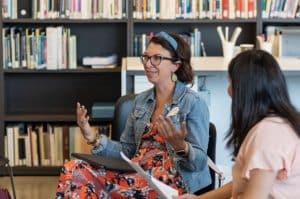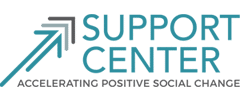“Power dynamics are a huge part of the story. Nonprofit partners didn’t want to say what was going on. But I think the conversations are changing. It’s becoming increasingly OK to say that everything isn’t perfect.” – Renu Mittal, Program Officer, Environment Program, Walton Family Foundation (WFF)
Support Center has a long history of working with funders, umbrella organizations, and intermediaries to engage in capacity building work with related nonprofits. Support Center’s 2022-2025 strategic plan also emphasizes the development of new long-term partnerships and the expansion of existing relationships. During our June Board Retreat session on Partnering with Support Center to Build Capacity in Multiple Ways, our community explored the different ways that the organization has established and evolved a number of different types of partnerships.
As a part of the conversation, we were joined by Emily Edwards, Executive Director at NYC Department of Small Business Services; Raffaella Glasser, Senior Manager, Food Access & Network Capacity, City Harvest; and Renu Mittal, Program Officer, Environment Program, Walton Family Foundation (WFF). Ted Geier, Support Center Affiliate Consultant, moderated the discussion.
Over the course of the discussion, there was an opportunity to explore a wide-range of types of partnerships. In the case of NYC Small Business Services, eight years of collaboration has afforded opportunities to deliver customized trainings, leadership circles, and learning communities. One such offering was Support Center’s Board Build program that allows executive directors and board leaders to engage in a peer learning cohort around governance. During the session, Emily Edwards noted that “one of the best parts of Board Build was the opportunity for executive directors to talk to one another.” As part of the program’s structure, participants share challenges and opportunities with one another.
The vast majority of business improvement districts with which Support Center is involved are unable to afford capacity building support on their own. Partnerships like the one with NYC Small Business Services are critical to advancing Support Center’s strategic focus on bridging barriers to access and providing these organizations with a range of programs.
Another key value for Support Center is establishing open and honest relationships that allow for vulnerability. Through the partnership with the Walton Family Foundation, Support Center has provided organizational navigation services, coaching, board development, and office hours to environmental organizations funded by the Walton Family Foundation environmental program. These resources are fully-funded by the foundation and provided at no cost to foundation grantees.
“Power dynamics are a huge part of the story. Nonprofit partners didn’t want to say what was going on,” was one of Renu Mittal’s central points during the session. “But I think the conversations are changing. It’s becoming increasingly OK to say that everything isn’t perfect.” In situations like this where Support Center has to navigate power dynamics and confidentiality with funders and their grantees, having funder partners who are aware of and responsive to the power between grantmakers and grantees is essential. And all of the panelists spoke about where and how they see and address power and confidentiality in their work as well as the need to bring humility and understanding to their work as funders.
Raffaella Glasser, Senior Manager for Food Access & Network Capacity with City Harvest picked up on this theme as well. Support Center and City Harvest have collaborated on customized training around fundraising and communications and co-designed a leadership program together this past Spring. “We spent a significant amount of time and attention designing a program that builds trust and enables participants to be open and honest about their organizational and individual challenges,” said Glasser.
The panelists reflected on the evolving nature of the work and how it is “becoming increasingly OK to say that everything isn’t perfect.” There was discussion of the shift in who is working as a program officer, and the movement around that trust building. “Of course there are issues. That’s why we do this,” stands out as one of the leading themes from the conversation and one that is closely tied to Support Center’s values. By accepting that issues and challenges are inherently a part of every organization, it becomes easier to address those challenges. And when long-term partners see and address the power dynamics and open the door to honest conversations and vulnerability, the potential for change and impact is that much greater.

Grunin Foundation Executive Director Heather Barberi attending Support Center’s 2023 Annual Retreat.
